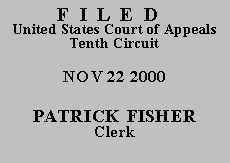

| ANTHONY MAXWELL,
v.
ERASMO BRAVO
Respondents-Appellees |
No. 00-2149
(D.C. No. CIV-99-123-JC/LFG) |
A New Mexico jury found Appellant Anthony Maxwell guilty of trafficking and distribution of a controlled substance. Maxwell's conviction was upheld on appeal. New Mexico courts denied post-conviction relief, and he petitioned the federal district court of New Mexico for a writ of habeas corpus pursuant to 28 U.S.C. § 2254. (Appeal Record, Vol. I, Doc. 1.)(1) Magistrate Judge Lorenzo Garza recommended that Maxwell's petition be denied with prejudice (Doc. 16), and the district court adopted that recommendation. (Doc. 19.) Maxwell filed a notice of appeal (Doc. 21), and the district court declined to issue a certificate of appealability. (Doc. 22.)
Maxwell raises five issues on appeal. First, he alleges that he was denied a fair trial because the jury foreperson was biased against him. He maintains that the foreperson knew him since childhood and that he "had conflicts"(2) with her brothers and other family members. Second, he alleges that the trial court erred in not declaring a mistrial after a prosecution witness twice referred to Maxwell as a "target," once after the trial court had admonished the witness not to use that word again. Third, at trial, Maxwell took the stand and revealed that he had been convicted of a felony four years earlier. On habeas appeal, he asserts the trial court erred in permitting the prosecutor, on cross-examination, to elicit from Maxwell that the conviction had been for marijuana distribution. Fourth, he argues that his Fifth Amendment rights were violated when, the day before trial, the original criminal information under which he had been charged was amended, changing the word "methamphetamine" to "amphetamine." Fifth, he alleges ineffective assistance of counsel for (i) failing to investigate an alibi, (ii) failing to move for a mistrial due to juror bias, (iii) failing to object when, allegedly, one or more jurors(3) were sleeping during trial, and (iv) failing to investigate and impeach the witness for the prosecution who testified Maxwell was a "target."
Issues two, three, four, and parts (i) and (iv) of issue five were raised to the magistrate judge. Issue one was raised for the first time to the district court. Parts (ii) and (iii) of issue five were first raised to this court.
We agree with the district court that the magistrate judge properly analyzed all the issues presented to it, including the issues now on appeal to us. Furthermore, the district court considered, and rejected, Appellant's first argument, finding "no constitutional violation in [Maxwell's] attorney's handling of voir dire and jury selection." Doc. 19 at 2 (Order Adopting Magistrate Judge's Findings and Recommended Disposition).
As to the new claims of ineffective assistance of counsel, they amount to new issues on appeal. See United States v. Reyes, No. 99-5133, 2000 WL 289618, at *1 (10th Cir. March 20, 2000). Because Defendant raises these claims for the first time in this appeal, we decline to consider them. See United States v. Mendoza- Lopez, 7 F.3d 1483, 1485 n. 2 (10th Cir. 1993).
Therefore, for substantially the reasons stated in the district court's order and the magistrate judge's findings and recommended disposition, we decline to issue a certificate of appealability. See 28 U.S.C. § 2253(c). This appeal is accordingly DISMISSED.
ENTERED FOR THE COURT
David M. Ebel
Circuit Judge
*.After examining appellant's brief and the appellate record, this panel has determined unanimously that oral argument would not materially assist the determination of this appeal. See Fed. R. App. P. 34(a)(2) and 10th Cir. R. 34.1(G). The case is therefore ordered submitted without oral argument. This Order and Judgment is not binding precedent, except under the doctrines of law of the case, res judicata, and collateral estoppel. The court generally disfavors the citation of orders and judgments; nevertheless, an order and judgment may be cited under the terms and conditions of 10th Cir. R. 36.3.
1.Subsequent citations to the Appeal Record will be to "Doc. #."
2.See Appellant's Opening Brief at 3.
3.See id. at 5.